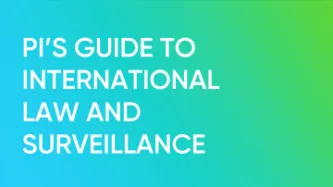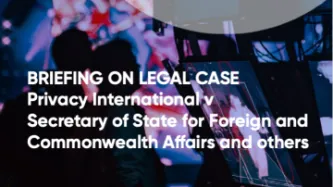Search
Content type: News & Analysis
In a significant and forceful decision, on 1 March 2024 the UK's Data Protection Authority found that the UK Government's GPS tagging of migrants arriving to the UK by small boats and other "irregular" routes was unlawful.
The decision comes as a result of Privacy International's complaint filed in August 2022 against the GPS tagging policy, which alleged widespread and significant breaches of privacy and data protection law. Our complaint relied extensively on anonymous testimonies of…
Content type: Long Read
18th December is International Migrants Day. It’s a day designated by the United Nations, dedicated to recognising the “important contribution of migrants while highlighting the challenges they face.”On this day we wish to recognise in particular the countless human rights violations that people experience at borders and within hostile immigration systems. We thank those who survive these violations for sharing with us and others their experiences of such violations, and for accepting to…
Content type: Long Read
We won our case against the UK’s Security Service (MI5) and the Secretary of State for the Home Department (SSHD). The Investigatory Powers Tribunal (IPT) – the judicial body responsible for monitoring UK’s intelligence and security agencies – held that MI5 acted unlawfully by knowingly holding people’s personal data in systems that were in breach of core legal requirements. MI5 unlawfully retained huge amounts of personal data between 2014 and 2019. During that period, and as a result of these…
Content type: Press release
In a landmark judgment, handed down today (Monday 30 January 2023), the Investigatory Powers Tribunal have found that there were “very serious failings” at the highest levels of MI5 to comply with privacy safeguards from as early as 2014, and that successive Home Secretaries did not to enquire into or resolve these long-standing rule-breaking despite obvious red flags.
Human rights organisations Liberty and Privacy International, who brought this significant legal case in January 2020, have…
Content type: Press release
The decision by the EU’s oversight body follows a year-long inquiry prompted by complaints outlining how EU bodies and agencies are cooperating with governments around the world to increase their surveillance powers filed by Privacy International, Access Now, the Border Violence Monitoring Network, Homo Digitalis, International Federation for Human Rights (FIDH), and Sea-Watch.
The complainants welcome the decision by the European Ombudsman and call on the Commission to urgently review its…
Content type: News & Analysis
In a judgment of 14 October 2022, the UK High Court ordered the UK Home Office to provide remedy to the thousands of migrants affected by its unlawful policy and practice of seizing mobile phones from people arriving by small boats to UK shores.
The availability and spread of new technologies, and the exponential amounts of data they generate, are regularly being abused by governments to surveil and control people - but these new forms of surveillance are only starting to make their way through…
Content type: News & Analysis
The relationship between privacy and access to abortion care
In 1973, in the state of Texas, it was a criminal offence to “procure or attempt” an abortion except if the purpose was “saving the life of the mother.” This law was enacted in 1854 by the Texas state legislature, and was part of a wave of provisions criminalising access to abortion care that was gaining ground across the U.S in the mid-1800s. It is worth highlighting that these laws were being passed at a time when women in the U.S…
Content type: Press release
Meta, the largest provider of social media sites and display advertising in the UK, acquired GIPHY, the largest provider of GIFs. In its report of 30 November 2021 the CMA found that the completed merger between Meta and GIPHY will give rise to a substantial lessening of competition.
The CAT confirmed the CMA's assessment and dismissed all but one of Meta’s appeal grounds, paving the way for Meta to sell GIPHY, as demanded by the CMA.
PI was granted permission to intervene in this case, one of…
Content type: Explainer
Introduction/Background
Electronic tags have been a key part of criminal justice offender management for over 20 years, being used in the United States since the mid 1980’s and in the UK and some other commonwealth countries since 2003. In 2021 the UK introduced GPS tagging for immigration bail.
The tag is predominantly used to curtail the liberties of individuals. For those on criminal bail its intended use includes managing return into communities while deterring reoffending.
As we explore…
Content type: Report
First published in 2017, “PI’s Guide to International Law and Surveillance” is an attempt to collate relevant excerpts from these judgments and reports into a single principled guide that will be regularly updated. This is the third edition of the Guide. It has been updated it to reflect the most relevant legal developments until December 2021.Despite its name, the Guide isn’t just aimed at lawyers. It aspires to be a handy reference tool for anyone engaging in campaigning, advocacy, and…
Content type: News & Analysis
The notorious Clearview AI first rose to prominence in January 2020, following a New York Times report. Put simply, Clearview AI is a facial recognition company that uses an “automated image scraper”, a tool that searches the web and collects any images that it detects as containing human faces. All these faces are then run through its proprietary facial recognition software, to build a gigantic biometrics database.
What this means is that without your knowledge, your face could be stored…
Content type: Video
<br />
Links
Read more about the ICO's provisional decision
Support our work
You can find out more about Clearview by listening to our podcast: The end of privacy? The spread of facial recognition
Content type: Long Read
At Privacy International, we challenge companies and governments who infringe on our privacy and facilitate, as well, violations of other human rights.
Our most recent challenge is against Clearview AI, a company that trawls the internet to save photos of our faces to form part of their biometric database to sell. We have filed complaints alongside 3 other organisations with regulators in the UK, France, Italy, Austria and Greece. Our goal is a clear message that there is no place in society…
Content type: News & Analysis
Update: Based on the complaint, on 30 November 2021 the Ombudsman opened an inquiry into whether the European Commission failed to take into account human rights concerns or carry out human rights impact assessments before providing support to African countries to develop surveillance capabilities.
___
Privacy International (PI) together with a coalition of human rights groups have today called on the European Ombudsman, the EU’s oversight body, to investigate evidence that the block is…
Content type: Long Read
Case: Privacy International v Secretary of State for Foreign and Commonwealth Affairs and others
Last update: December 2022
Summary
The UK Security and Intelligence Agencies (SIAs) – including Government Communications Headquarters (GCHQ), Security Service and Secret Intelligence Service – have been building massive comprehensive datasets of information on each and every individual. They have been collecting and combining information from multiple sources on unclear legal bases and with minimal…
Content type: News & Analysis
What happened
On 22 July 2021, the Investigatory Powers Tribunal (IPT) issued a declaration on our challenge to the UK bulk communications regime finding that section 94 of the Telecommunications Act 1984 (since repealed by the Investigatory Powers Act 2016) was incompatible with EU law human rights standards. The result of the judgment is that a decade’s worth of secret data capture has been held to be unlawful. The unlawfulness would have remained a secret but for PI’s work.
You…
Content type: Long Read
The Grand Chamber of the European Court of Human Rights ruled that the UK government’s historical mass interception program violates the rights to privacy and freedom of expression. The Court held that the program “did not contain sufficient “end-to-end” safeguards to provide adequate and effective guarantees against arbitrariness and the risk of abuse.” As a result the Court ruled that UK law "did not meet the “quality of law” requirement and was therefore incapable of keeping the “…
Content type: Long Read
The role of the Human Rights Act in shaping UK jurisprudence has been discussed at length since the European Convention on Human Rights was brought into UK law. This ongoing discussion was recently fueled by former UK Supreme Court judge Jonathan Sumption’s Reith Lectures, where he voiced concerns in relation to European Court of Human Rights (ECtHR) jurisprudence specifically in relation to Article 8 and the right to privacy.
We disagree with this view. The Human Rights Act has led…
Content type: Video
On 6 February 2021, the Constitutional Court of South Africa in a historic judgment declared unconstitutional years of secret and unchecked surveillance by South African authorities against millions of people - irrespective of whether they reside in South Africa.
The Court powerfully placed the judgment in historical context:
The constitutionally protected right to privacy seeks to be one of the guarantees that South Africa will not again act like the police state that it was under apartheid…
Content type: Long Read
What’s the ruling all about?
The Constitutional Court of South Africa in a historic judgment declared that bulk interception by the South African National Communications Centre is unlawful and invalid. Furthermore, the Constitutional Court found that the Regulation of Interception of Communications and Provision of Communication-Related Information Act (RICA) 1) was deficient in failing to provide at least a post-notification procedure for subjects of interception; 2) failed to ensure the…
Content type: News & Analysis
Today, the Constitutional Court of South Africa in a historic judgment declared that bulk interception by the South African National Communications Centre is unlawful and invalid.
The judgment is a confirmation of the High Court of South Africa in Pretoria’s powerful rejection of years of secret and unchecked surveillance by South African authorities against millions of people - irrespective of whether they reside in South Africa.
The case was brought by two applicants, the amaBhungane Centre…
Content type: Long Read
On 8 January 2021, the UK High Court issued a judgment in the case of Privacy International v. Investigatory Powers Tribunal. The Secretary of State for Foreign and Commonwealth Affairs and Government Communication Headquarters (GCHQ) appeared as interested parties to the case.
After our initial reaction, below we answer some of the main questions relating to the case.
NOTE: This post reflects our initial reaction to the judgment and may be updated.
What’s the ruling all about?
In…
Content type: Frequently Asked Questions
On 8 January 2021, the UK High Court issued a judgment in the case of Privacy International v. Investigatory Powers Tribunal. The Secretary of State for Foreign and Commonwealth Affairs and Government Communication Headquarters (GCHQ) appeared as interested parties to the case.
After our initial reaction, below we answer some of the main questions relating to the case.
NOTE: This post reflects our initial reaction to the judgment and may be updated.
Content type: News & Analysis
Today, the UK High Court has quashed a decision by the Investigatory Powers Tribunal (IPT) and held that section 5 of the Intelligence Services Act (ISA) 1994 does not permit the issue of general warrants to authorise property interference and certain forms of computer hacking.
The Court referred to cases dating back to the 18th century, which demonstrate the common law’s insistence that the Government cannot search private premises without lawful authority even in the national security…
Content type: Press release
Today, the UK High Court has quashed a decision by the Investigatory Powers Tribunal (IPT), and ruled that section 5 of the Intelligence Services Act (ISA) 1994 does not permit the issuing of general warrants to authorise property interference and certain forms of computer hacking.
The Court referred to cases dating back to the 18th century, which demonstrate the common law’s insistence that the Government cannot search private premises without lawful authority even in the context of national…
Content type: News & Analysis
Today, the CNIL announced fines of €100 million and €35 million for Gooogle and Amazon, respectively, for breaches of the French Data Protection Act.
The fines resulted from two separate investigations carried out by CNIL in relation to the use of cookies on the French websites of Google and Amazon.
The decision against Google
While it seems to be broadly stated that the CNIL fined Google €100 million, a more accurate statement is that the CNIL fined Google LLC (the parent company of Google’…
Content type: Long Read
Privacy and security are both essential to protecting individuals, including their autonomy and dignity. Undermining privacy undermines the security of individuals, their devices and the broader infrastructure. People need privacy to freely secure themselves, their information, and fully enjoy other rights. However, a growing number of governments around the world are embracing hacking to facilitate their surveillance activities.
As a form of government surveillance, hacking presents…


























